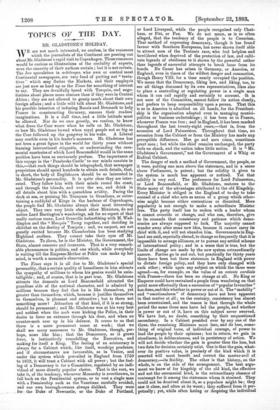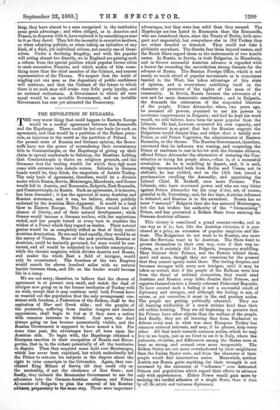TOPICS OF THE DAY.
MR. GLADSTONE'S HOLIDAY.
WE are not much interested, we confess, in the romances which the journalists of the Continent are pouring out about Mr. Gladstone's rapid visit to Copenhagen. Those romances would be curious as illustrations of the credulity of experts, were the sincerity of their authors certain ; but it is not certain. The Jew speculators in arbitrages, who own or control most Continental newspapers, are very fond of putting out " tenta- tives " which may flutter the Markets, and their employes are just now as hard up as the Times for something of interest to say. They are dreadfully bored with Tonquin, and nego- tiations about places more obscure than if they were in Central Africa ; they are not allowed to gossip much about their own foreign affairs ; and a little wild talk about Mr. Gladatone,and his possible intention of inducing Russia and Denmark to help France in counteracting Germany, amuses their readers' imaginations. It is a dull time, and a little latitude must be allowed. Nor do we care greatly, we confess, to know what dress the Czar wears when he calls on Mr. Gladstone, or how Mr. Gladstone bowed when royal people not so big as the Czar followed up the gangway in his wake. A Liberal may confide even in his leader's manners. Mr. Gladstone has not been a great figure in the world for thirty years without learning international etiquette, or understanding the cere- monial courtesies of which Lord Beaconsfield would in the same position have been so unctuously profuse. The importance of this voyage in the 'Pembroke Castle' to our minds consists in this,—that such things should be telegraphed, that newspaper proprietors should spend hundreds to obtain such details, that, in short, the body of Englishmen should be so interested in Mr. Gladstone's personality. It is quite clear they are inter- ested. They follow him with their minds round the coast, and Through the islands, and over the sea, and drink in all details about him with a quenchless avidity. Pacing the deck at sea, or praising Mr. Tennyson to Orcadians, or enter- taining a cuddyful of Kings in the harbour of Copenhagen, the people find Mr. Gladstone always their most interesting object. They care very little about other Ministers, do not notice Lord Hartington's wanderings, ask for no report of that really curious scene, Lord Granville hobnobbing with M. Wad- dington and the " Marquis " Tseng together, and deciding in chitchat on the destiny of Tonquin ; and, we suspect, are not greatly excited because Mr. Chamberlain has been studying Highland crofters. They cannot take their eyes off Mr. Gladstone. To .them, he is the Ministry, the Government, the State, almost concrete and incarnate. That is a very remark- able phenomenon in politics, and one which, while everybody is waiting till the Empress-Mother at Pekin can make up her mind, is worth a moment's observation.
The Times says it is all due to Mr. Gladstone's special personality, that a certain quality of homeliness in him attracts the sympathy of millions to whom his genius would be unin- telligible; and, of course, that is in part true. Mr. Gladstone attracts the domestic as Lord Beaconsfield attracted the grandiose side of the national character, and is admired by millions because they feel that ho is like themselves, yet greater than themselves, which, because it justifies themselves to themselves, is pleasant and attractive ; but is there not something more ? Attraction of that kind, if it is so strong, should be permanent ; and Mr. Gladstone was at his very best and noblest when the mob were kicking the Police, in their desire to force an entrance through his door, and when no counter-mob rose up in his defence. It seems to us that there is a more permanent cause at work ; that we shall see many successors to Mr. Gladstone, though, per- haps, none like him ; that the Democracy, as it grows freer, is instinctively remodelling the Executive, and making for itself a King. The feeling of an aristocracy is always for a Cabinet which, like itself, worships prudence, and if circumstances are favourable, as in Venice, and under the system which prevailed in England from 1750 to 1832, it will trust a Cabinet with all power ; but the feel- ing of a Democracy is for a Committee, regulated by an indi- vidual of more directly popular choice. That is the root, we take it, of the tendency, whenever Monarchy is overthrown, to fall back on the Presidential system, or to vest a single man with a Premiership such as the Venetians carefully avoided, and our own borough-owners always disliked. They were , for . the Duke of Newcastle, or the Duke of Portland, or Lord Liverpool, while the people recognised only Chat- ham, or Pitt, or Fox. We do not mean, as is so often alleged, that the tendency of the people is to Csesarism. That method of expressing democracy, though it has found' favour with Southern Europeans, has never shown itself able to attract men of the Teutonic race, who feel helpless and bewildered when deprived of the protection of law, and culti- vate legends of obedience to it shown by the powerful rather than legends of successful attempts to break loose from its bonds. No Omar has arisen in Germany, or America, or England, even in times of the wildest danger and commotion, though Henry VIIL for a time nearly occupied the position. We mean that the Democracy, liking law, and liking, too, to see all things discussed by its own representatives, likes also to place a controlling or regulating power in a single man whom it can call rapidly and certainly to account. .It is not sure of the Committee, cannot follow its action closely, and prefers to heap responsibility upon a person. That this. is so in America is admitted on all hands, for the President- ship is the organisation adopted even in managing munici- palities or business undertakings ; it has been so in France, whenever France was free ; and in England, it has been markedn throughout the last twenty-eight years,—that is, from the accession of Lord Palmerston. Throughout that time, no, secession from the Cabinet or from the Ministry has made any perceptible difference. Men go and men come, sometimes. great men ; but while the chief remains unchanged, the party feels no shock, and the nation takes little notice. It is "Mr. Gladstone's Government," not the Government of a Whig or Radical Cabinet.
The danger of such a method of Government, the people, air it were, putting one man above the statesmen, and in a sense above Parliament, is patent ; but the solidity it gives to the system is much less apparent or noticed. Yet that solidity is very real. The preference for Lord Palmerston, or Lord Beaconsfield, or Mr. Gladstone, restores to the State many of the advantages attributed to the old Kingship. Every Minister is obliged in the England of to-day to take counsel of a chief who acts as nexus of a group which other- wise might become either contentious or disunited. Mere popularity is not enough to make a subordinate Minister free. The party itself has to reckon with a leader whom it cannot override or change, and who can, therefore, give to its counsels that consistency and patience which demo- cracies are always supposed to lack. The majority cannot wander away after some new idea, because it cannot carry its chief with it, and will not abandon him. Governments in Eng- land are said, especially abroad, to change so frequently that it is impossible to arrange alliances, or to pursue any settled scheme of international policy ; and in a sense that is true, but the limits of change are made by the new syatem extraordinarily narrow. Parties go in and out, but practically for thirty years- there have been but three statesmen in England with power to dictate foreign policy, and they have only changed with each other ; while upon any subject on which the three were agreed—as, for example, on the value of an entente cordial* with France—there has been no change at all. No King or Emperor could have restrained a people from wandering on that point more effectually than a succession of "popular favourites" has done, and this whether in power or out of it. The "mobility" and " emotionaloess" of democracy have not been apparent in that matter at all ; on the contrary, consistency has almost been overstrained, and the reason is that through the whole period the same three men have led the people, and whether in power or out of it, have on this subject never swerved. We have lost, no doubt, something by their unquestioned ascendancy. In a Cabinet presided over by any one of the three, the remaining Ministers must lose, and do lose, some- thing of original force, of individual courage, of power to lead the people by their opinions ; but in return, we gain in steadiness in deliberateness, and in persistency of action. We will not decide whether the gain is greater than the loss, but two data for decision certainly exist. One is that the gain, what- ever its positive value, is precisely of the kind which it is asserted will most benefit and correct the master-evil of democracy,—its fluidity. The other is that history, on the whole, is on the side of the arrangement. The beat argu- ment we know of for kingship of the old kind, the effective and not the ceremonial kind, is the extraordinary absence of contempt for it among the statesmen whom it strained. They could not be deceived about it, as a populace might be ; they saw it close, and often at its worst ; they suffered from it per- petually; yet, while often hating or despising the individual
king, they have almost to a man recognised in the institution some great advantage ; and when obliged, as in America and France, to dispense with it, have replaced it by something as near to it as they dared. They felt the necessity in executive matters, or when adopting policies, or when taking an initiative of any kind, of a final, yet individual referee, not exactly one of them- selves. Under a declining kingship, and with the popular will acting almost too directly, we in England are gaining such a referee from the special position which popular favour allots to each successive Premier, and which makes of him some- thing more than the chief member of the Cabinet, and nearest representative of the Throne. We suspect that the habit of singling out one man as the depositary of public confidence will continue, and that the Cabinet of the future in which there is no such man will evoke very little party loyalty, and no national enthusiasm. A Government in which all were equal would be an invisible Government, and no invisible Government has ever yet attracted the Democracy.



































 Previous page
Previous page